Peter MALONE
Saturday, 18 September 2021 19:24
Return of the Secaucus Seven, The
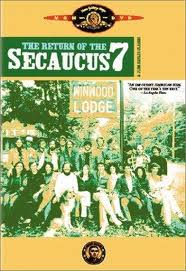
THE RETURN OF THE SECAUCUS SEVEN
US, 1980, 109 minutes, Colour.
Bruce Mc Donald, Adam Le Fevre, Karen Trott, Gordon Clapp, David Strathairn.
Directed by John Sayles.
The Return of the Secaucus Seven was one of Time Magazine's ten best of 1980. While it would be spot-on for U.S. audiences, it has universal appeal because it is so well written, directed and edited (all by John Sayles - writer of Piranha, Alligator, Howling, though this film is worlds away from Horror). Portraying a weekend reunion of seven turning-30s who recall their turbulent 20s and feel some need to settle and shape their lives, the film (frequently very funny) sounds very real, shows warmly details, situations with which we are so familiar that not only do we respond to the characters, we can pleasingly learn a lot about and from them - strengths, mistakes, goodness, malice, melancholy.
1. The film's reputation in America? Time Magazine's acclaim? Interest and entertainment for non-American audiences?
2. The work of John Sayles? Writing, editing, acting, directing? His Hollywood career - and writing horror films? His age, the experience about which he writes, first-hand knowledge and insight, his ear for language and talk, his eye for detail? Middle American interests and values? The upheaval of the '60s, the protest of the '70s, the settling down of the late 1970s?
3. The style of the film as a home movie? A blending of personal techniques with commercial skill? The authentic atmosphere of the location photography? Audiences getting to know Mike and Kate's home? Other interiors? The town itself, streets, shops, theatre, countryside? The authenticity of the characters - appearance, manners, talking and acting, reacting? The quality of the editing for pace, humour?
4. The significance of the title, its parody of protest groups of the late '60s? The explanation as applying to the group? Highlighting the adolescence of the '60s? The young adulthood of the '70s? The nature of protest - motives, causes, behaviour? The humour about Secaucus? The group reaching 30, taking stock of itself? The individuals and the reflection on their 20s, the prospect of 30 and 35? An optimistic and settled viewpoint? The experience of upheaval? The experience of happiness, success? The need for survival, ambition? The melancholy and nostalgia? The presentation of the age group of American society? Its contrast with previous generations? Its influence on the next generation?
5. The style of the film: the introduction of each of the characters, seeing them in ordinary situations, hearing them talk? Appreciating them, strengths and weaknesses? The vivid detail of their interaction? Shared experiences? The domestic style, talk? The predictability and non-predictability? The topics of conversation, manner, ease with one another? Funny and sad?
6. The framework of the weekend reunion? Mike and Kate and their discussing and planning, the details of preparation? The build-up to the various individuals on the way? The meetings, initial interaction, sense of fun and talk? The variety of moods, changes in relationships, sadness? The reinforcing of some relationships? The prospects for the coming year - standards of normality? A pleasing group?
7. The important details of house preparation by Mike and Kate? J.T. and his encounter with the garage attendant? His wanting a lift? His meeting Frances? Irene and Chip and Chip's awkwardness, anxiety about meeting the group? Irene bolstering him? Maura and her walking out on Jeff? The allotting of rooms? The build-up to Jet’s birthday and the birthday cake? Going to the play and the criticisms of the actress? The emphasis on sex and Kate's curiosity? Her misjudging Frances and Maura? The contrast of the two breakfasts presented? Jeff and his arrival and J.T's telling the truth? The long sequence and collage of the basketball-playing and the atmosphere irking the men? The walks, the swimming, the posing and diving? The showing off? The encounter with Howard and his wife and the kids? Memories of schooldays? The outing at night, singing and dancing, J.T's singing, drugs and the discussion about drugs? The encounter with the deer and the irony of their being arrested? The aftermath and their leaving? Ordinary goodbyes? Jeff and his chopping the wood and leaving the note? J.T. and the offers of money and his hopes for Los Angeles? The attention to the detail of each incident giving a flavour for the film and its cumulative effect? e.g. the sports sequences, the swimming, the night out, the jail sequence?
8. The variety of moods, emotions, past relationships and shifting relationships, love and friendship, jealousy, bitchiness, shyness and fear? Age and change?
9. Michael and Kate and their talk, the house, gossip, the background of their teaching and Mike's mock class to the group with J.T. acting up? Kate and her going to the play, criticisms, watching the night arrangements? Their interaction, humour? Their farewell to the group and assessment of how the weekend had gone? The audience seeing things through their eyes?
10. J.T. and his singing, hitch-hiking, relationships with the girls, capacity for joking, his dropping out? The relationship with Irene and the memories, being picked up by Frances? The night with Maura and Frances' reaction? His telling Jeff? His songs, enjoyment of the day? Irene and the offer of money? Maura and the offer of companionship? His setting out for Los Angeles - to what future?
11. Irene and Chip - the humour of the changing of the tyre, Chip's awkwardness in meeting the group and feeling out of it, being victimised at the basketball? Enjoying his bacon and eggs for breakfast? His reaction to the play? The swimming, talking with Jeff? The killing of the deer? The relationship with Irene and passing the test with the group? Their background of work for the senator, plenty of money and success?
12. Frances and her work as a doctor, her joy in talking about being present at the birth? The attraction towards Ron and hearing him on the snowmobiles? Spending the night with him? The group joking and singing the song from The Pyjama Game?
13. Maura and her being upset, arrival, explanation about coming without Jeff, the play, the night with J.T.? Jeff's arrival and his knowledge of the truth? Their anger with each other? Jeff and his self-centredness, friendship with J.T., his talk with the various men in the group especially of the swim? The drugs? Reaction to the arrest? His chopping the wood and his inability to say goodbye?
14. Ron and his work in the town at the garage? Howard and his wife and the children?
15. The incidental characters - the police, the drunken referee and the humorous talk in the jail?
16. The achievement of the film in presenting a cross-section of a group, showing them as they were, highlighting memory, growing up, changes in responsibilities? The background of educated middle America settling down to adulthood? The blend of humour, observation, wisdom?
Published in Movie Reviews
Published in
Movie Reviews
Tagged under
Saturday, 18 September 2021 19:24
Return of the Pink Panther, The
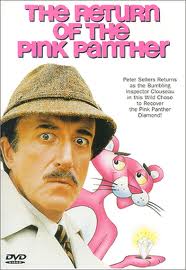
THE RETURN OF THE PINK PANTHER
UK, 1974, 113 minutes, Colour.
Peter Sellers, Christopher Plummer, Catherine Schell, Herbert Lom, Peter Arne, Graham Stark.
Directed by Blake Edwards.
Peter Sellers' character, Inspector Clouseau, is one of his most enjoyable. Sellers and Director, Blake Edwards, contrive and get away with a lot of obvious jokes, sight gags, play on accents, parody of "Topkapi", Casablanca" and the original film. The credits re-introduce the cartoon character and his tune. Christopher Plummer is stodgy as the Phantom. Catherine Schell enjoys herself as his wife. She laughs so heartily at some scenes with Sellers it looks as though they left these parts in the final product. For hearty laughs.
1. The quality of this comedy, its general appeal?
2. The success of the structure: Clouseau himself, the phantom, the coinciding of the two strands of plot? The blend of comedy and thriller aspects?
3. The credit sequence for establishing mood? The music? The popularity of Preceding films?
4. The impact of the initial robbery, the parody of so many films?
5. The importance of the character of Clouseau? Peter Sellers, his characteristics the pomposity e.g. the robbery at the bank while he talked? The exasperation of Dreyfuss? The martial arts scenes with Cato?
6. The focus of the film on Clouseau's manner of investigation: his errors, jokes, lack of judgement, accent? Laughs with him or at him?
7. Which were the best comedy pieces in the film? which the best jokes? Situations, dialogue? Slapstick?
8. Claudine Lytton and her leading on of Clouseau? Her enjoyment of his antics?
9. The sub-plot of Sir Charles? The interest in the characters of Sir Charles, his adventures, the parody of the film Casablanca, his discovery of his wife's deceit, the escape, the pursuit?
10. Did the film build up to its finale?
11. The quality of the humour on the foibles of human nature?
12. The humour and violence. especially the cruelty to Dreyfuss, and the pain for Pepi at his hands? The tone of the film ending with Dreyfuss in a straightjacket?
Published in Movie Reviews
Published in
Movie Reviews
Tagged under
Saturday, 18 September 2021 19:24
Return of Swamp Thing, The
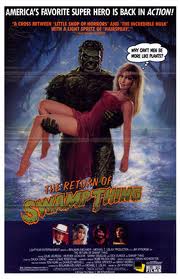
THE RETURN OF SWAMP THING
US, 1989, 83 minutes, Colour.
Louis Jourdan, Dick Durock, Heather Locklear, Sarah Douglas.
Directed by Jim Wynorski.
Return of Swamp Thing is a sequel to the original film of 1981, or a remake. Once again, Louis Jourdan is the suave, mad doctor, doing all kinds of mutant experiments to find the elixir of life and immortality. Heather Locklear is his Californian stepdaughter who is to become his victim. Swamp Thing is a good doctor, victimised by an experiment gone wrong, who saves people in the swamp. Sarah Douglas is an adequate villain (Superman, Red Sonya).
The film is tongue-in-cheek style, parody of the science fiction films and alluding to such movies as the Frankenstein series, the Mad Doctor series and Beauty and the Beast. (At one stage, Jourdan moves into a parody of some of the lyrics of Gigi.)
1. Comic strip entertainment? Serious, comic, parody?
2. The Bayous, the lonely mansions, the laboratories and their equipment? The grounds of the mansion, the swamps? Atmosphere? Georgia locations?
3. The make-up of the creatures, Swamp Thing, the mutants? Special effects and stunts? Atmospheric score?
4. Abby and her quest for self-knowledge, California, the plants and naming and talking to them? Her stepfather, bar visit, the arrival, everything new, the move to horror? The encounters with Swamp Thing? The doctor's plan to use her for his formula, her being rescued? The tongue-in-cheek sexuality of the love fantasy with Swamp Thing? Lana and her putting her in the laboratory, her energy going into her stepfather, the final rescue? The end with Swamp Thing - and her foot sprouting?
5. Louis Jourdan's urbane style as Professor Arcane (And the symbolism of that name?), unemotional, suave, his quest for immortality? His use of Lana and Dr. Rochelle? The experiments? His seeming detachment? The parody of the lines from Gigi? His attitude towards his stepdaughter, wanting to use her for experiments? His bodyguards and their terrorist get-up and style? His frustration with the experiments? Relationship with Lana, planning to use her? Lana and the transformation from Abby? Killing her? The quiet ending
as he sat resigned in the explosions and fires?
6. Dr. Rochelle and Lana: scientists and their style, manner, the exhibits, their amoral tone towards such experimentation? Dr. Rochelle and his mannerisms with his breath, being transformed into a mutant? Lana and her
saving Abby? Deaths?
7. Gunn and the mercenaries, their terrorist style, the bodyguard girl, her shooting the police, the background of their lives, telling the story of all their wounds in all the terrorist and mercenary activities of 15 years? The parody of the Rambo style?
8. The police, their initial disappearance, the encounter with the monster? Swamp Thing saving the guard with his glasses? Nice? The encounters with Abby? Swamp Thing as victim, rescuer, hero, confrontations?
9. The allusions to popular science fiction, mad doctor films, Frankenstein, Beauty and the Beast?
Published in Movie Reviews
Published in
Movie Reviews
Tagged under
Saturday, 18 September 2021 19:24
Red Scorpion
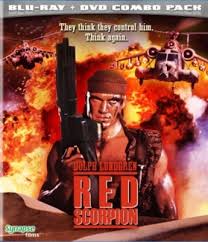
RED SCORPION
US, 1989, 100 minutes, Colour.
Dolph Lundgren, M.Emmett Walsh, T.P.McKenna
Directed by Joseph Zito.
Red Scorpion is an action thriller designed to capitalise on its musclebound star, Dolph Lundgren (Rocky's Soviet opponent in Rocky IV, Masters of the Universe). It was directed by Joseph Zito, director of the first Missing in Action film with Chuck Norris.
Lundgren is a presence rather than an actor. The film is not strong on the glasnost attitudes between America and the Soviet Union in the later '80s. This is an attack on the Soviet Union, their influence in Africa, their ruthlessness. For a while the film looks as if it is a variation on Tarzan and The Gods Must Be Crazy as the hero lives with the Bushmen in Africa. However, it soon turns into an explosive Rambo.
1. Popular action thriller? American gung-ho? The touch of Tarzan? The finale as Rambo?
2. Africa, the action, stunts and special effects, editing and pace, rousing score?
3. American-Soviet? relationships? the clash? Russian influence in Africa? Becoming neutral and the hopes of the African nations?
4. Dolph Lundgren and his presence on-screen, acting ability? Nikolai as the Russian machine and special agent? The interview with the general, his mission in Africa, pretending to be drunk, the brawl in the bar, going to prison, ingratiating himself with the African chief, meeting the journalist, their escape? Travelling through the desert? Seeing the effect of the Soviet massacres? The village, his wanting to kill the African leader, his being outwitted and ousted? His being taken by the Russians, tortured by the Cuban?- His reaction and escape? Meeting the Bushmen after being bitten by the scorpions? His being revived, with the Bushmen, learning how to hunt the boar? The initiation ceremony, the scorpion on his chest? Throwing away his Russian identity medals? The final attack on the village, saving the Africans? The explosive Rambo hero? The final confrontation with the general and his death?
5. The portrait of the Russians, the general, their attitudes towards Africa, massacring villagers, torturing Kkolai, the final attack?
6. The Africans, the dignity of their leader, in prison, the attempted assassination of the leadership? The people, their suffering, fighting?
7. The Bushmen, their being at home, visible and invisible, saving Nikolai from the scorpions, training, hunting, amused, the initiation?
8. The popularity in the '80s of this kind of slambang heroics and politics?
Published in Movie Reviews
Published in
Movie Reviews
Tagged under
Saturday, 18 September 2021 19:24
Return of a Man Called Horse, The
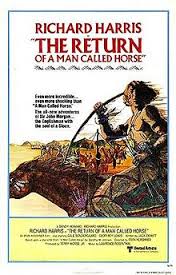
THE RETURN OF A MAN CALLED HORSE
US, 1976, 125 minutes, Colour.
Richard Harris, Gale Sondergaard, Geoffrey Lewis, Bill Lucking.
Directed by Irvin Kershner.
Whatever appealed to audiences in the original film is incorporated into this satisfying sequel, Return of a Man Called Horse. Indian life, white riff-raff, the Englishman-hero become Indian, the overtones of anthropology, especially in the alarming torture test of endurance, repeated here in more ritual form, not only for Sir John Morgan, but for the Yellow Hand braves and initiates. After a long pre-credits look at English life, the film takes us to a familiar West of brutality and survival, a sympathetic look at the oppressed Indian and the stuff of legend. A necessary kind of Western for our times to shake any complacency in presuppositions about white supremacy and its consequences.
1. Was this a good film? As a sequel, comparison with the original? Standing in its own right? Its recreation of atmosphere, study of themes? For what audience was it made? For those wanting more of the original in terms of hero, Indians, Indian way of life?
2. The importance of colour, Panavision? The re-creation of nineteenth century England and its style of life, the contrast with the American frontier, the fort, the Indian camp? The natural environment for the Indians and the west? Audience expectations from this? Western conventions? An Indian film,, the white man amongst Indians?
3. The significance of the prologue: Morgan and his restlessness after his experience in America. the details of his English way of life. the hunt. church-going. the prospect of marrying.. administering the estate, living the idle life of a well-to-do gentleman? Was this presented with credible detail? Did it help explain the motivation for his return?
4. The visual presentation of his return. the contrast visually of the American west with England? The portrayal of the Indians,. the Yellow Hand and their persecution, the massacre? The effect on the oppressed Indians. their dispirited way of life, loss of dignity and vitality. slaves of the whites?
5. The presentation of the whites and their Indian allies? The way of life in the fort, greed and brutality, the Commander and his obsession, his abuse of the Indians. the sexual abuse of the Indians. the violence and their deaths? The film's building up a need for retribution and redemption?
6. The significance of the return of Morgan on the Yellow Hands? Their welcoming him back. the reaction of the Chief, the men, the women and the children, his friends? The importance of showing the details of Indian way of life and Morgan involved in all of these?
7. The significance of the ritual? Its presentation in the previous film? The visual presentation of torture? The effect on Morgan, on the braves? The purpose? What did it prove, how necessary was it?
8. Morgan and his interaction with the whites at the fort? His pretending to be the fopping English gentleman, making a show of himself, his surveying the situation, his witnessing the shooting of the girl? His eluding his pursuer and killing him?
9. The picture of the Indians as they revived, the significance of their eating meat, their warriors, their pride?
10. The preparation for the raid? The details of the canvassing of the fort, the preparations of firearms and explosives for the attack?
11. Audience involvement in the raid itself? The massacre of the whites? The death of the Commander? Where did audience sympathies lie?
12. The film's comment on American history, on white and Indians and their interaction? The values of civilized way of life? The values of the civilized Indians?
13. The importance of this film for Anthropology. History. Indian legend, the legend of Morgan himself.
Published in Movie Reviews
Published in
Movie Reviews
Tagged under
Saturday, 18 September 2021 19:24
Retreat, Hell!
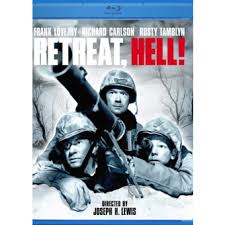
RETREAT, HELL!
US, 1952, 95 minutes, Black and white.
Frank Lovejoy, Richard Carlson, Anita Louse, Russ Tamblyn.
Directed by Joseph H. Lewis.
Retreat, Hell! is one of the many films made in the early '50s about the Korean War. The films made at the time tended to be morale-boosters, e.g. Mission Over Korea, The Steel Bayonet. Later films were able to assist the war and its impact on Asia and the United States e.g. The Bridges at Toko Ri. The Hunters, Pork Chop Hill. This film was made by Joseph H. Lewis, an action director who has become a cult figure in later decades. His film such as My Name Is Julia Ross and The Halliday Brand have been re-assessed and considered as minor classics. This is a competent well-made action war film with the collaboration of the United States Information Services and the forces. It has good performances, good war scenes - and is in the tradition of the conventional American war
film.
1. The impact of a film about the Korean war in its time? Now? Morale-boosting? An accurate picture of the United States? Its morale-boosting - but the picture of a defeat and America's not being able to cope in Korea?
2. The traditions of the war film? The background of the protagonists in their civilian life, training, action, crises in action? The film's use of background material? Documentary? Newsreel?
3. Black and white photography, American sequences, the re-creation of the atmosphere of Korea? Special effects, especially for the battle sequences? Musical score?
4. A picture of episodes in the Korean war? Its impact on the United States in the light of World War Two? The recalling of old Marines? The training of the younger men? The hard-hitting training? The details of training? Embarkation for Korea? Groups on the march? Action? Fear? Death and injury? The encounter with the Koreans and their reaction to the Americans? Chinese troops? The impasse in the war? The significance of the title? The work of Macarthur?
5. The presentation of the range of leading men? The Commander and his tough attitudes, leading his men in action, his wise understanding of how they reacted? The friendship between Hansen and Corbett? The family man leaving his family? Re-training? Exercising leadership in action? Initial clashes with authority? McDermott? as the eager young man? Stepping out for training and being humiliated? His bouncy eagerness? His fear under fire? His looking for his brother? His death? The special mission and his becoming a marine? Conventional types - well presented?
6. The details of training? Training and action in Korea? The special missions? The presence of death? McDermott’s? brother?
7. Themes of heroism, courage, endurance? Comradeship in arms?
8. The comment on the Korean war in the light of subsequent American history and American involvement in Asia? The value of this kind of film as echoing the spirit of the times? A gauge for measuring historical interpretation?
Published in Movie Reviews
Published in
Movie Reviews
Tagged under
Saturday, 18 September 2021 19:24
Remarkable Mr Pennypacker, The
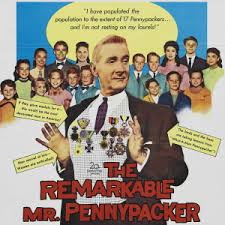
THE REMARKABLE MR PENNYPACKER
US, 1959, 87 minutes, Colour.
Clifton Webb, Dorothy McGuire?, Charles Coburn, Ray Stricklyn, Jill St. John, Ron Ely, David Nelson.
Directed by Henry Levin.
The Remarkable Mr Pennypacker is a Clifton Webb comedy. He perfected the brusque, witty and somewhat supercilious screen character. In Laura, The Razor's Edge he did it in a serious context. But as M1r. Belvedere in Sitting Pretty he brought it his own particular comic tone - which he was to repeat in many films during the '50s including Dreamboat. He was also the star of Cheaper By The Dozen - and this film is somewhat reminiscent of that comedy.
Mr Pennypacker is a free thinker is Harrisburg at the turn of the century. It appears that he is also a bigamist, spending alternate months with a family in Harrisburg and a family in Philadelphia. (Somewhat reminiscent of the Alec Guinness comedy, The Captain's Paradise.)
Dorothy McGuire? (who appeared with Webb in Three Coins in the Fountain) is the gentle wife. A young Jill St. John is the eldest daughter. Charles Coburn enjoys himself blustering as Webb's father.
There are a lot of comments about free thinking, American manners and morals and a pleasant piece of American period comedy.
1. An entertaining comedy? Piece of Americana? A reflection on American morals and values - with the light touch?
2. Harrisburg and Philadelphia at the turn of the century? Decor and costumes? Inventions?
3. The title and the ironic focus on Mr. Pennypacker? His ideas, behaviour? Free thinking? His theories on bigamy? - But the finale with his marriage to one woman only, forsaking all others?
4. Clifton Webb's wit, acid and supercilious style as Mr. Pennypacker? His behaviour in his home? With Emily, with the children? His going away for one month? The revelation of his other family? His free thinking, the series of cartoons on Darwin's theories - with the insult to the Police Chief? The arrival for the wedding? The car turning over - and his confrontation with the cow and burning the hay? His being caught out? His father's attack on him? Emily's grief? The children running away? Dr. Fielding and his reaction? The arrest and his night in the cells? His release? The family council and their forgiving him? Emily's visit to Philadelphia? The wedding - and the reconciliation and new wedding for Horace and Emily? A sardonic character? A comment on American values?
5. The theme of bigamy gently presented? Horace Pennypacker and his love for Emily and her children, his devotion? His business? His devotion to his other family? The pros and cons of bigamy? The reaction of the various characters? The finale?
6. Emily and her family, their genteel way of life? Her bringing up of the family? Kate and the prospective wedding? The shock at the truth? Emily being hurt? Her visit to Philadelphia, meeting the other children? Her hard stance on the issue? The new wedding?
7. The two families of children - and their similarities? The detail of children's behaviour? Kate, the bicycle, her love for Wilbur? The proposal? Dr. Fielding and his hesitation? The crisis of the bigamy? Kate and her being hurt? The reconciliation and the happy wedding?
8. Mr. Pennypacker Senior and his firm, arrival in the house, bluster, the bailiff and his attack, the night in jail, his attitudes towards his son? Jane as the spinster, her fainting? Her going to help the family in Philadelphia?
9. The touches of domestic life? The changing ways of the 20th century? Inventions? Business? Manners and morals?
Published in Movie Reviews
Published in
Movie Reviews
Tagged under
Saturday, 18 September 2021 19:24
Rent Control
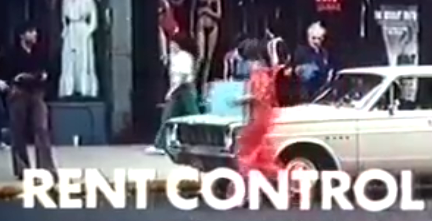
RENT CONTROL
US, 1981, 90 minutes, Colour.
Brent Spiner, Elizabeth Stack, Leonard Melfi.
Directed by Gian Luigi Polidoro.
Rent Control is a Film Festival feature. A small-budget New York production, it illustrates the quality of film-making by independents - with the comparisons of feature films and studio work. The non-name cast is very good, the production budget is small - however there is much good humour and pleasing observation of life in the large American city.
1. An interesting example of independent film-making? Production qualities? Colour photography, use of locations, editing? Non-name cast?
2. The conventions of the feature film about life in New York with its difficulties? Housing, caravans? Marriages and break-ups? Relationships? The employment situation?
3. The focus on the hero: Leonard - his living in New York, his looking for an apartment, the relationship with his wife, the cosmetician she is living with, the child in Canada in the camper, relationship with girls and their not warming to him, his seeking for inspiration in his writing career? The put-upon American hero?
4. The sketch of Leonard's wife, child, the cosmetician? The attention to detail and the humour of the characters as well as the pathos?
5. The details of Leonard's looking for an apartment - and the characters that he encounters? His social life and his relationship with girls?
6. The basic plot - its episodic nature, character sketches? Humour, sentiment, drama?
7. How perceptive a look at New York in the early '80s? The American way of life? The American dream - and the humdrum details of day to-day life?
Published in Movie Reviews
Published in
Movie Reviews
Tagged under
Saturday, 18 September 2021 19:24
Rentadick
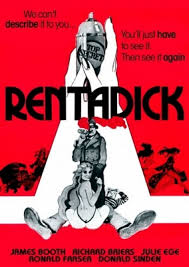
RENTADICK
UK, 1972, 94 minutes, Colour.
James Booth, Richard Briers, Julie Ege, Donald Sinden, Roy Kinnear.
Directed by Jim Clark.
Rentadick is one of those breathless comedies of the late '60s and early '70s from Britain. It is in the vein of such satiric farces as The Bliss of Mrs. Blossom or The Magic Christian. It is of historical interest insofar as the screenplay was written by John Cleese and Graham Chapman. There is additional dialogue by John Wells and John Fortune. The Monthly Film Bulletin from England referred to the Cleese- Chapman style as 'clipped lunacy' and there is a great deal of that. However, it is also pointed out that this works better in short sketches rather than in a full-length feature. The film starts with rather breathless pace and seems to be very clever comedy indeed. However, as the film moves on it becomes confusing and tedious rather than creative and imaginative.
The film also highlights British sex farce, stereotypes and humour. A solid British cast goes through its paces trying to give life to the writing, the sight gags, the editing.
The film can be seen as a stage in the development of the acting and writing careers of the Monty Python group, especially John Cleese and Graham Chapman, who were soon to make Monty Python and the Holy Grail. Chapman was Brian in The Life of Brian and this remains one of the best examples of the Python group working in feature films.
Published in Movie Reviews
Published in
Movie Reviews
Tagged under
Saturday, 18 September 2021 19:24
Report to the Commissioner
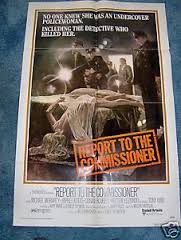
REPORT TO THE COMMISSIONER
US, 1974, 112 minutes, Colour.
Michael Moriarty, Yaphet Kotto, Susan Blakeley, Hector E11zondo, Tony King.
Directed by Milton Katselas.
Report To The Commissioner is not one of the police heroics sagas. Rather, it is a deadly serious look at recent Post-Watergate? America, this time a police cover-up and the vicious consequences of face-saving lies and victimisation. A very naive young policeman is involved in a crisis. Audience attention is challenged - changing from suspicion to sympathy and dismay. There is plenty of New York "atmosphere" and some exciting chases, culminating in a tense wait-out in an elevator. Michael Moriarty is the young man, Susan Blakely effective as an ambitious undercover agent. Writer Abby Mann wrote Judgement at Nuremburg, Ernest Tidyman, The French Connection. The film is grimly engrossing.
1. This film seen within the popular police genre of the 70s? How similar, how different? Why the popularity of this genre on film and television?
2. The emphasis of the title on the report, the structure of the film in terms of the report? (The English title was Operation undercover - was this a better title?) The mid-seventies and the political and police reports, the atmosphere of Watergate and cover-ups in reports? The critical tone of the film?
3. The writers were responsible for The French Connection and Judgement at Nuremburg. Combining issues: injustice, exciting police chases etc.?
4. How involved was the structure of the film? Initial sympathies concerning Bo, the flashback structure, the filling in of the report, interviews, the changing attitudes towards Bo and towards the police? Growing audience involvement?
5. How strong were audience sympathies for Bo? The quality of the performance of Bo? Critics' attitudes in thinking that he was unreal and naive? Are young people like this? our reaction to the initial killing? His suffering, naivety, the background of his father? His earnestness to succeed with the police? Training, first assignment, shabby look? Crunch and his initiating him into the wags of the police? The police decision to use him? His not being informed fully about Patty Butler? His ingenuity in tracing her? His feelings of protection? The ultimate violence, accidental death, chase and final confrontation? The naive young nun used and becoming a victim of authority?
6. The importance of the New York atmosphere, the locations of the streets and their sleaziness, the drug peddlers, the police officers, the sordid and squalid atmosphere? The importance of this for understanding police work?
7. How well did the film build up the background of the elevator crisis, a death, Bo's shooting?
8. The nature of the crisis, the psychological conflict, leading to his hanging himself? The futility of his life and career? The grim commentary of the proceedings?
9. Comment on the picture of the New York Police: their work, their efficiency, the people they had to deal with, problems, criminals, the atmosphere of secrecy. The plans of De Angelo, the approval from authority, the presumption to move without authority, the need for cover-up because of initiative and subordinates thinking they had good ideas? The chief ordering the report, then refusing to act publicly on it? The audiences judgement on such cover-ups?
10. The portrayal of Crunch, his work, skills, contacts, friendship and guiding of Bo?
11. The character of Patty Butler? Young and ambitious, the scene where she wanted to succeed, her skills, her moving in with Henderson, her trying to ward off Bo, the futility of her death?
12. How did the film communicate the atmosphere of the drug world? Stick and his wealth, the character, the peddling?
13. The police contacts, e.g. the messenger with no legs?
14. The set-pieces of the clubs, the streets, the hustling?
15. The excitement of the chase of the man with no legs and his holding on to the cars etc.? Plausible? Dramatically important for the film?
16. The melodrama and excitement of the roof chase? The chase in the store?
17. How intense was the confrontation in the elevator? Two guns pointing at each other? The psychological conflict? The lack of trust, the need for trust and banding together? The taunts of the police? The inevitability of Stick's death? The confusion for Bo? His emerging from the elevator?
18. How important was the soul-searching of America and the American police in this film? Is such probing necessary?
Published in Movie Reviews
Published in
Movie Reviews
Tagged under